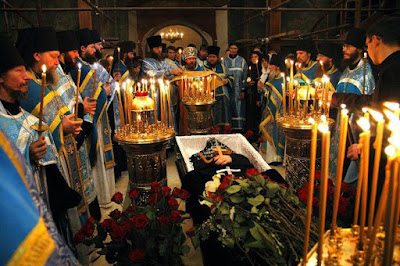Limitless and without consolation would have been our sorrow for close ones who are dying, if the Lord had not given us eternal life. Our life would be pointless if it ended with death.
Then a man leaves all his earthly cares; the body disintegrates, in order to rise anew at the General Resurrection. Often this spiritual vision begins in the dying even before death, and while still seeing those around them and even speaking with them, they see what others do not see.
But when it leaves the body, the soul finds itself among other spirits, good and bad. Usually it inclines toward those which are more akin to it in spirit, and if while in the body it was under the influence of certain ones, it will remain in dependence upon them when it leaves the body, however unpleasant they may turn out to be upon encountering them.
For the course of two days the soul enjoys relative freedom and can visit places on earth which were dear to it, but on the third day it moves into other spheres. At this time (the third day), it passes through legions of evil spirits which obstruct its path and accuse it of various sins, to which they themselves had tempted it.

How terrible these demons and their toll-houses are may be seen in the fact that Mother of God Herself, when informed by the Archangel Gabriel of Her approaching death, answering her prayer, the Lord Jesus Christ Himself appeared from heaven to receive the soul of His Most Pure Mother and conduct it to heaven. Terrible indeed is the third day for the soul of the departed, and for this reason it especially needs prayers then for itself.
Then, having successfully passed through the toll-houses and bowed down before God, the soul for the course of 37 more days visits the heavenly habitations and the abysses of hell, not knowing yet where it will remain, and only on the fortieth day is its place appointed until the resurrection of the dead. Some souls find themselves (after the forty days) in a condition of foretasting eternal joy and blessedness, and others in fear of the eternal torments which will come in full after the Last Judgment. Until then changes are possible in the condition of souls, especially through offering for them the Bloodless Sacrifice (commemoration at the Liturgy), and likewise by other prayers.
Therefore, panikhidas (i.e., Trisagion Prayers for the Dead) and prayer at home for the dead are beneficial to them, as are good deeds done in their memory, such as alms or contributions to the church. But especially beneficial for them is commemoration at the Divine Liturgy. There have been many appearances of the dead and other occurrences which confirm how beneficial is the commemoration of the dead.
Many who died in repentance, but who were unable to manifest this while they were alive, have been freed from tortures and have obtained repose. In the Church prayers are ever offered for the repose of the dead, and on the day of the Descent of the Holy Spirit, in the kneeling prayers at vespers, there is even a special petition "for those in hell."
Every one of us who desires to manifest his love for the dead and give them real help, can do this best of all through prayer for them, and particularly by commemorating them at the Liturgy, when the particles which are cut out for the living and the dead are let fall into the Blood of the Lord with the words: "Wash away, O Lord, the sins of those here commemorated by Thy Precious Blood and by the prayers of Thy saints."
 We can do nothing better or greater for the dead than to pray for them, offering commemoration for them at the Liturgy. Of this they are always in need, and especially during those forty days when the soul of the deceased is proceeding on its path to the eternal habitations.
We can do nothing better or greater for the dead than to pray for them, offering commemoration for them at the Liturgy. Of this they are always in need, and especially during those forty days when the soul of the deceased is proceeding on its path to the eternal habitations.
The body feels nothing then: it does not see its close ones who have assembled, does not smell the fragrance of the flowers, does not hear the funeral orations. But the soul senses the prayers offered for it and is grateful to those who make them and is spiritually close to them.
O relatives and close ones of the dead! Do for them what is needful for them and within your power. Use your money not for outward adornment of the coffin and grave, but in order to help those in need, in memory of your close ones who have died, for churches, where prayers for them are offered. Show mercy to the dead, take care of their souls.
Before us all stands the same path, and how we shall then wish that we would be remembered in prayer! Let us therefore be ourselves merciful to the dead.
As soon as someone has reposed, immediately call or inform a priest, so he can read the Prayers appointed to be read over all Orthodox Christians after death.
Try, if it be possible, to have the funeral in Church and to have the Psalter read over the deceased until the funeral.
Let us take care for those who have departed into the other world before us, in order to do for them all that we can, remembering that "Blessed are the merciful, for they shall obtain mercy."





No comments:
Post a Comment